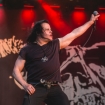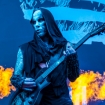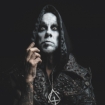It's 10 A.M. in Brooklyn, New York, and Adam Nergal Darski is about to receive the stigmata.
And he is psyched.
Despite the early call time and the fact that he's fresh off a flight from Poland and still shaking off jet lag, Behemoth's main blasphemer has hit the ground running when he arrives at Revolver's studio for today's photo shoot. Phone in hand, Nergal strolls around the industrial warehouse excitedly live-streaming introductions to his Instagram followers: "Say hi Revolver!"
For the past two decades Nergal has cultivated a holistic approach to creating his art. He actively embraces different mediums, philosophies and cultural experiences in the pursuit of breaking free from institutional control, be it political, religious or otherwise. The singer-guitarist's wicked creativity manifests most prominently in Behemoth's blackened-death sound and stunning live shows, anti-Christian themes and gorgeously heretical imagery, and, as of late, his own candidly irreverent social media presence — all of which have earned his band a massive international fan base, and pissed off a lot of Christians (and a few governments) in the process.
So it's with particular glee — and a frankly startling amount of energy — that he takes to this morning's task: flipping through our makeup artist's stigmata-inspired special effects, examining the liturgical wardrobe options, enthusiastically passing around custom tarot cards and sharing the designs for his new God = Dog vegan dog treats (in the shape of crosses, obviously).
"Jesus fucking Christ," he exclaims later when we sit down to talk about I Loved You at Your Darkest, Behemoth's 11th and latest album. "It's the busiest I've ever been in my life. But at the same time, I'm pretty fucking happy about it, too, you know, because the reception to the record is just great. The adrenaline is there and I'm just pushing. I'm just fucking killing it."
Since 2010 Nergal has been living an invigorated, full-throttle existence — a renaissance period born out of the direst of situations. That summer he received the unthinkable diagnosis of leukemia, and underwent a rigorous course of treatment that included months of chemotherapy and ultimately a bone-marrow transplant. Soon after he completed treatment and doctors gave him the news that his cancer had gone into remission, Nergal began the process of rebuilding.

He rose to unforeseen levels of Polish celebrity and paparazzi fodder — not for his recurring clashes with the government over his anti-Christian stage shows or controversial T-shirts, but thanks to his head-scratching yet ultimately entertaining decision to become a judge on Poland's The Voice, and his highly publicized relationship with Polish pop-star royalty Doda.
More significantly, Nergal also began work on Behemoth's most powerful album to that point, 2014's The Satanist, which epitomized the blackened death-metal form while simultaneously expanding its parameters. At the time of its release, even Nergal himself considered The Satanist to be such an honest expression that he speculated on whether or not the band would write another record. So for the next few years he focused on extensive touring in support of the album. He also began exploring new sides of himself: from unveiling his stripped-down, dark-folk project Me and That Man and launching his Barberian barber shops, to cultivating his yoga practice, occult studies and his cheeky, upbeat social media persona — which all seem to stand in stark contrast to Behemoth's highly grim onstage presentation, but speak volumes to the fact that Nergal is far from some brainless, devil-worshipping metal cliché.
Exploration has been a central, and essential, component to his trajectory — the roots of which can be traced back to his formative years in Gdańsk, Poland in the Eighties, where the budding musician came of age during his country's radical transition from communist to democratic rule. A few years after the communist restrictions were lifted in 1989, Nergal was finally able to secure a passport, and the teenage black-metal musician hit the road to seek inspiration.
"The [Berlin] Wall came down and the Iron Curtain came down and it just opened whole new doors," he says. "I could really unveil my nomadic nature and embrace it."
Now at 41, he's healthier, clearer and more committed to living life, creating art and crossing borders than ever before. His band, which also includes drummer Inferno and bassist Orion, have just dropped their most blasphemous album yet, I Loved You at Your Darkest — an adventurous, seething record that expands the expertly constructed grandeur of The Satanist into exciting new territories. For him, his art is an extension of his desire to seek truth, and free himself — and anyone else that wants to join him — from systems of control. And by his own account, he's just getting started.
"I'm just opening up with every next experience and every next year I'm just even more open because I don't stop evolving," he says. "The more I explore the world, the more knowledge I embrace, you know, I just can't see myself regressing. It would be a paradox."
WE'RE TALKING TODAY ABOUT EXPLORATION, WHICH CAN BE PHYSICAL, MENTAL, SPIRITUAL AND OF COURSE MUSICAL. DO YOU REMEMBER THE FIRST TIME YOU DEVIATED FROM THE PRESCRIBED PATH THAT WAS SET OUT FOR YOU?
NERGAL I can't really recall one particular moment that I tried to convert from something I was before. But on one hand, I guess the moment that I got my first guitar kind of triggered something new: this determination, this passion to play an instrument. And maybe subconsciously it was a way to see myself stepping out of the current. My life has been all about standing up, getting up from my knees, trying to do things that are different, that are against the current and the system.
AFTER THE FALL OF COMMUNISM IN POLAND, YOU WERE ABLE TO GET A PASSPORT AND TRAVEL. WHERE DID YOU GO?
I was only, like, 17 just traveling on my own with my passport. I was already so much into the underground scene, I started making pen-pal friends all over the world. My first destination was Germany, and I would just go there and hang out with these people, socialize, go to the shows. I would travel to Scandinavia. The second wave of black metal thing was already on the rise and I was part of that. I felt very passionate about it. And that was also times where there were no budget flights. So I remember taking the bus 20, 25 hours from Gdańsk, where I used to live, to Germany or somewhere else, just sitting there listening to my Walkman, you know, some Mayhem or Sisters of Mercy, and being excited that I'm in a new environment.
YOUR WANDERLUST HAS LED YOU TO SOME FAR-OUT LOCATIONS SINCE. WHAT WAS THE FIRST PLACE YOU VISITED THAT HAD THE MOST IMPACT ON YOU?
My first really life-changing experience was my first trip to Nepal. It must have been 2005. It was just me going there for, like, two weeks. One week I spent in Kathmandu, and then the next week I traveled to Pokhara. And from there I took a trek in the Himalayan mountains. I would just hire a guide, get my backpack, a book and music. That's it … No phone, no contact, no problems. [Laughs] It was really overwhelming, really weird, really different. And I loved it.
CAN YOU MAKE A DIRECT CONNECTION BETWEEN THESE JOURNEYS AND YOUR OWN CREATIVITY?
Absolutely. Back then, I was more into just exploring and embracing different flavors. I'd be out there with my tape recorder to get sounds, as well. I'd go to some Buddhist temples up in the mountains and we'd attend some of their prayers or the chants. I've done that in a temple in Egypt, too. I went to Istanbul, Turkey, to Hagia Sophia. When you get hundreds of tourists inside the building, because of the acoustics, you can't hear particular voices. All you hear is this ambient music. It was really crazy. I recorded and put it in the background of Behemoth's music, but now when I play Apostasy or Demigod and some other albums, I couldn't even recognize where I put something. But I strongly believe that it works on the subconscious level.

YOU'VE ALSO SPENT TIME IN VARANASI, WHICH IS CONSIDERED THE SPIRITUAL CAPITAL OF INDIA, AND THE LOCATION OF MANY PUBLIC CREMATION RITUALS. DID THEIR CULTURAL TRADITIONS SURROUNDING DEATH INTEREST YOU?
Yeah, I was there lately, like two years ago, and it's absolutely enlightening … What all monotheistic religions inject in our systems is the fear of death … While in polytheistic religions like the Hindu ones and more pagan-based ones, I think those people are just way closer to human nature by embracing all of it … There's poverty. There's rich people. The human body, it dies, it decomposes. They have these burial rituals, they burn bodies by the Ganga [Ganges] river. And it's really striking, like me coming from Catholic conservative Poland, just going there and smelling that, getting all the vibes — the incense, burning bodies — it's a really striking experience, man. It's really important in order to learn about yourself and about the world and also learn that we're all only victims of time and space … The fact that I was born in Poland is just a pure fucking coincidence because I could have been born there, and be taking a bath in the river Ganga. So the fact that you don't understand something, it doesn't mean you should reject that. Embrace it, you know, don't even try to analyze it too much … I think that was [Marcel] Schmier [Schirmer] from Destruction who said lately that most of the countries would avoid a lot of their racial problems and nationalistic problems if traveling was obligatory for all the kids in all the schools.
SOME PRACTICES OF CERTAIN HINDU SPIRITUAL GUIDES DO APPEAR PRETTY EXTREME TO THE UNINITIATED. DID YOU SPEND ANY TIME WITH SADHUS?
Yes. When we did a show in Nepal, I went to an Aghori meeting. They are the Shiva priests who usually live close by the Ganga. And they feed on ashes or corpses … remains from human bodies they will catch from the Ganga. They practice their rituals and they eat it because they just believe … When they consume it, they believe that they're actually consuming and communing with Shiva.
WOW. WHAT WAS IT LIKE SPENDING TIME WITH SOMEONE WHO EATS HUMAN REMAINS? WERE YOU INTIMIDATED?
Yes, yes. I had the meeting with the guy and spent some time in, like, a small little cave … My Polish friend, he knew Nepali so he would just translate everything to me and I spent maybe 30 minutes there. There were some ritual tools, one of them was a trident. The room looked a little bit like Watain's bunker, because I've been there in Stockholm, Sweden. [Laughs]
YOU'VE BECOME PRETTY COMMITTED TO PRACTICING YOGA. IS THAT SOMETHING YOU PICKED UP DURING YOUR TRAVELS?
Well, I started doing yoga when I was released from the hospital because I was advised not to do any heavy workouts … So I started practicing it for a couple of weeks, but I didn't really get it back then … I was actually in Hawaii last year and I was lucky because I had this amazing hotel five meters from the beach. And there was this yoga class starting every day at 7:00 a.m. run by this elder lady … It's just amazing, it's super fresh, you know, the water and the breeze. And you are sitting there with your eyes shut, and just trying to connect with yourself through yoga, and I was hooked.
DO YOU FEEL LIKE YOU ARE A RESTLESS PERSON, AND DOES YOGA HELP YOU CALM YOURSELF?
Yes. Yeah, I think it just calms me down … One of the things [responsible] for me to start doing yoga was my neurosis. I've had this anxiety problem for 20 years now … It started disturbing my body at the age of 22, [when] I had the first attacks. I had this, like, poking in my heart and … shallow breath … I had the worst attack, one-half year ago.
IS IT PANIC?
Yeah, panic … I may get claustrophobic in an elevator. Actually [when] this attack occurred I was in beautiful scenery. I was in the Alps just fucking snowboarding and I was on the lift, on my own, and then it just hit me, man. It was like, boom. Oh shit. And that's where the panic started. So it was very unexpected and it really … it really fucked me up … It was super difficult to handle it. But I manage …
AROUND THE RELEASE OF THE SATANIST, YOU HINTED THAT IT MIGHT BE THE FINAL BEHEMOTH ALBUM. WAS THERE A PARTICULAR SPARK THAT GOT YOU INSPIRED TO MAKE ANOTHER RECORD?
No, there was no, like, turning point. I just took some time off after The Satanist because I wasn't really sure if I can continue doing that music because if the music is not there, I'm the last person to be trying to fabricate The Satanist, Demigod or even Evangelion just to cash in … I Loved You at Your Darkest is just a different endeavor. It's a different chapter and it's more dynamic, it's more diverse. It's different, you know, and I'm happy it's a different record yet it's a very radical, very extreme record.
THE NEW TRACK "BARTZABEL" REFERENCES A SPECIFIC ALEISTER CROWLEY RITUAL THAT TOOK PLACE RECENTLY IN KRAKOW. DO YOU PERSONALLY ENGAGE IN ANY RITUALS?
I've never really had a need to be part of any of the organized rituals, as much as I'm attracted by the power and energy of them. And I'm not saying I'm not going to do that, but I'd rather stick to my daily rituals … Using my intuition and connecting dots and making my own magic … I really feel the presence of the powers of nature in the pagan sense. And obviously I have a massive respect for that. I really like to work on reconnecting every now and then with the universe. And that is magical to me.
DO YOU BELIEVE THERE ARE FORCES OUT THERE — ELEMENTAL OR OTHERWISE — THAT ONE ACTUALLY DRAWS POWER FROM? OR ARE THESE PROCESSES JUST TOOLS FOR UNLOCKING INNATE HUMAN POTENTIAL?
That's complex. I don't know. Again, I'm aware of these elements. I'm conscious of their presence in my life … There's this theory on the microcosm and maybe I could use that now to kinda back up my answer. I know the universe dwells within me. The universe dwells within a grain of sand, as William Blake said. And yeah, embracing one's self, and your potential, isn't unequal to embracing the universe. A lot of that stuff may sound very surreal. But, I just know how limited my language and vocabulary is to fully express myself in a clear way. That's, I guess, why I became an artist. So what I'm saying here is, like, two or five percent of what my life is. And if I didn't make myself clear here now talking to you, let my music be the extension of my knowledge, because this is all my mouth can say. All the rest, it's what my body says with my art, with my aesthetics around it and so on and so on. There's an amazing quote that I should probably get tattooed on me one day, [even though] it's, like, tattooed on my heart. It's from Nietzsche, who said, "There's more wisdom in your body than in your deepest philosophy." You can come up with the most sophisticated formulas … so fucking what, you know? This [points to his body] will tell you everything. No language can really describe what's really important. Amen.












